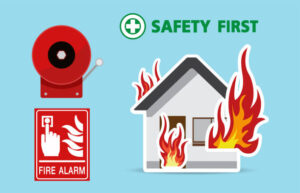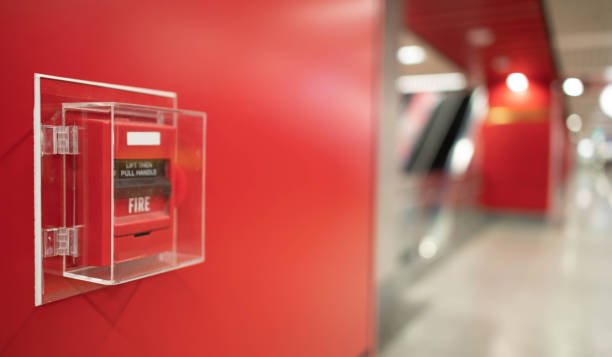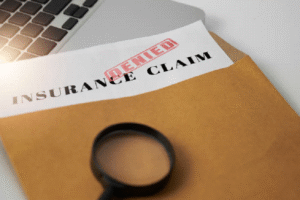Fire safety isn’t just about ticking legal boxes—it’s about protecting the people living in your rental properties and the investment you’ve worked hard to build. Fires can happen suddenly, and the consequences can be devastating. Beyond the obvious dangers to tenants’ lives, fires can cause massive property damage, costly repairs, and complicated insurance claims. As a landlord, making fire safety a priority isn’t just smart—it’s essential.
In this post, we’ll walk you through why fire safety matters, what your key responsibilities are, and practical tips to keep your rental properties and tenants safe from fire risks. Whether you’re a new landlord or have years of experience, this guide will help you create a safer home environment for everyone.
Why Fire Safety Should Be a Top Priority for Landlords
Imagine the worst-case scenario: a fire breaks out in your rental property, and it spreads quickly. In just minutes, a home can be destroyed, and worse, people’s lives could be at risk. Fires are one of the fastest, most dangerous emergencies a tenant can face. That’s why fire safety isn’t just a legal responsibility—it’s a moral one.
What’s at stake?
-
Legal risks: Landlords can be held responsible if they don’t meet fire safety regulations or provide a safe living environment.
-
Financial costs: Property damage, higher insurance premiums, potential lawsuits, and loss of rental income all add up.
-
Tenant trust: A safe property means happy tenants who feel secure, helping you keep good renters longer.
-
Protecting lives: Above all, you’re responsible for the people living under your roof.
By focusing on fire safety, you’re protecting your investment and showing tenants you care about their well-being—a win-win.

What Are Your Fire Safety Responsibilities as a Landlord?
Every country and state has its own specific rules, but here are the core fire safety obligations most landlords must follow. Always check your local laws to ensure compliance.
-
Smoke alarms: These are a must-have on every level of the home and near bedrooms. They save lives by warning tenants early.
-
Carbon monoxide detectors: Required in many places where gas or fuel-burning appliances are used.
-
Fire extinguishers and sprinkler systems: Maintain and provide these where applicable.
-
Clear fire exits: Ensure escape routes and exits are easy to access and clearly marked.
-
Regular inspections: Conduct yearly checks on electrical wiring, heating systems, and appliances to prevent hazards.
Meeting these requirements is just the starting point. Going beyond them can greatly reduce fire risks and create peace of mind for you and your tenants.
9 Practical Fire Safety Tips Every Landlord Should Know
Here are some hands-on strategies to help you make your rental properties safer and more fire-resistant.
1. Install and Regularly Test Smoke Alarms
Smoke alarms are your first line of defense against fire. Install them in all bedrooms, hallways, and living spaces. Test alarms monthly and change batteries yearly. A working smoke alarm can alert tenants early enough to escape safely.
2. Schedule Electrical Inspections
Electrical faults are a leading cause of residential fires. Hire a licensed electrician to inspect wiring, outlets, and appliances before tenants move in—and at regular intervals after. Fixing damaged or outdated wiring promptly is key.
3. Provide Fire Extinguishers in Strategic Spots
Place fire extinguishers where fires are most likely to start—typically kitchens, basements, and garages. Teach tenants how to use them safely. This can stop small fires from becoming disasters.
4. Create and Share a Fire Escape Plan
Work out a clear, simple evacuation plan for each property. Share it with tenants when they move in, and encourage them to practice it. Include details on all escape routes, meeting points outside the building, and emergency contacts.
5. Regulate the Use of Space Heaters and Candles
Space heaters and candles may be cozy but they’re high-risk fire hazards. Consider banning them or providing safer alternatives like electric heaters with automatic shut-off features. Educate tenants on the dangers and safe usage.
6. Inspect Heating Systems and Chimneys Annually
Furnaces, fireplaces, and chimneys should be cleaned and inspected yearly to avoid blockages or buildup that could spark fires. This maintenance is crucial for winter safety.
7. Enforce No-Smoking Policies
Smoking indoors dramatically increases fire risk. Including a no-smoking clause in your rental agreements can reduce this risk and keep your property cleaner.
8. Educate Your Tenants About Fire Safety
Good communication goes a long way. Provide tenants with fire safety guidelines, checklists, or even a quick walkthrough to point out alarms, extinguishers, and exits. Well-informed tenants are more likely to act quickly and safely in emergencies.
9. Keep Common Areas Clear and Accessible
Hallways, stairwells, and exits should always be free of clutter. Blocked pathways can slow escape and create additional hazards during a fire emergency. Regularly inspect shared spaces to keep them safe.

Your Fire Safety Checklist: What to Review Regularly
Before tenants move in—and throughout their lease—run through this checklist to ensure your property stays fire safe:
-
Working smoke alarms and carbon monoxide detectors
-
Easily accessible and functioning fire extinguishers
-
Clear and unobstructed emergency exits
-
Safe, up-to-date electrical wiring and heating systems
-
Tenant understanding of fire safety rules and evacuation plans
Using a checklist like this helps catch issues early and shows you’re proactive about safety.
Fire Safety Compliance: What You Need to Know
Many regions have strict fire safety laws and building codes for rental properties. Not following these rules can result in hefty fines or even legal trouble. It’s a good idea to work closely with local fire marshals or property inspectors who can help you understand the rules and confirm your property meets all standards.
Remember: compliance isn’t just about avoiding penalties—it’s about doing what’s right to keep everyone safe.
Fire Safety Is Good for Business, Too
Landlords who prioritize fire safety stand out in the rental market. Prospective tenants want to feel secure in their homes, and knowing that their landlord takes safety seriously can be a deciding factor.
Plus, a fire-safe property means fewer emergencies, less downtime for repairs, and better insurance rates. Protecting your property with fire prevention measures helps preserve its value and your income over time.
Final Thoughts: Fire Safety Is a Continuous Commitment
Fire safety isn’t a “set it and forget it” task. It requires regular attention, maintenance, and tenant education. From smoke alarms to escape plans, every step you take strengthens your property’s defenses against fire risks.
If you’re unsure where to start or want to create a tailored fire safety policy for your rental properties, don’t hesitate to reach out. Together, we can help you build a safer environment for your tenants and protect your investment.





